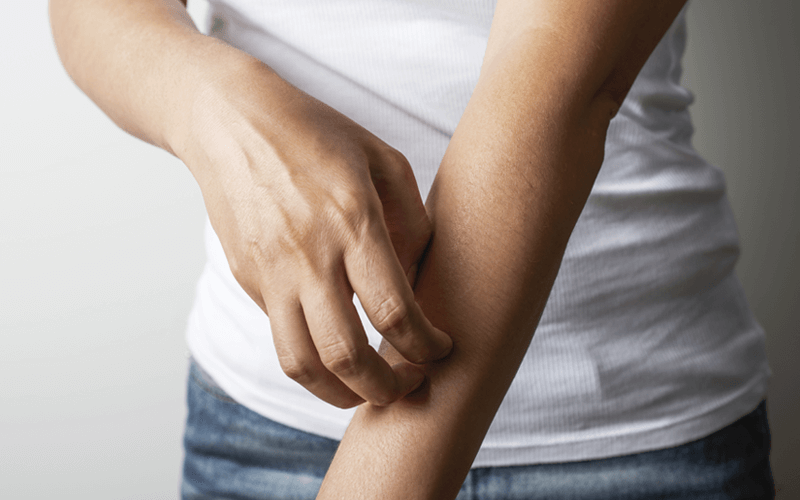Dealing with the symptoms of eczema — itching, redness, cracked skin, inflammation, blistering, weeping — is bad enough, but battling the misconceptions around this common skin condition can make it even worse. You might be wondering, is eczema contagious? Let’s bust five of the biggest eczema myths.
Myth 1: Eczema is caused by stress or poor personal hygiene.
Fact: Stress can worsen many skin conditions, including eczema (also known as dermatitis), but it is not the primary cause. Eczema has nothing to do with personal hygiene.
The genetic condition can be triggered by a variety of environmental factors. Researchers do not know everything there is to know about the condition’s causes, but they believe people with eczema may also have immune systems that overreact to irritants or allergens.
Sufferers may also have a genetic mutation that affects the body’s ability to create a healthy protective top layer of skin — allowing moisture to escape and bacteria to enter.
Because it is genetic, people with eczema are likely to have family members who also suffer from it. They are also much more likely to have asthma, hay fever or allergies. As many as 10 to 20% of infants and 3% of adults and children in the U.S. suffer from the condition.
Myth 2: Once you have eczema, you’ll always have eczema.
Fact: There is no “cure” for eczema, but most infants who develop the condition outgrow it by their 10th birthday, and about half of children outgrow it by adulthood.
Those who develop the condition in infancy or childhood are likely to outgrow it, and those who don’t typically display milder symptoms as adults than they did as children. Adults with the condition cannot be “cured,” but there a wide variety of medications and lifestyle changes that can minimize symptoms.
Dry, irritated skin can be treated with topical corticosteroids to lessen inflammation; topical immunomodulators; oral antihistamines to reduce itchiness, and antibiotics to treat associated skin infections. A board-certified dermatologist can help you find the best course of treatment.
Myth 3: There’s nothing you can do to prevent eczema flare-ups.
Fact: There are a variety of lifestyle changes you can make to minimize your symptoms and manage your eczema.
Keeping your skin hydrated is one of the most vital things you can do, so make moisturizer your best friend. You should apply it at least twice a day, every day, especially after showering or bathing. Run a humidifier in your home to reduce your contact with hot, dry air.
If you know allergens or irritants that trigger eczema outbreaks for you, do everything you can to avoid them. Choose detergents and products made especially for sensitive skin, and give your pets dander treatments.
You may have been told that you can’t enjoy summer pool time if you have eczema, but that’s not entirely true. You may just need to take extra precautions if the chlorine negatively affects you. Slather on the moisturizer immediately before going for a swim, shower off the chlorine as soon as you get out and then moisturize again. You may also find that gradually increasing your time in the water will help your body adjust to it.
Finally, avoid scratching as much as possible. Wear soft fabrics and cotton rather than wool or other itchy fibers. Keep your nails short, so you don’t break the skin, and seek itch-relief solutions from your dermatologist.
Myth 4: All eczema is the same.
Fact: The National Eczema Association identifies eight types of eczema. Your board-certified dermatologist can diagnose you and recommend the right treatments for your condition.
The most common type of eczema, particularly among children, is atopic dermatitis, which is closely related to hay fever and asthma.
The second type, contact dermatitis, is most likely to develop in adults. As its name implies, this type occurs when you come into contact with an irritant. Irritants may include detergents, paint, bleach, solvents and other chemicals. Some people develop this type of eczema after encountering these irritants in the workplace.
Other types of eczema include dyshidrotic (aka pompholyx) eczema, which produces blisters on the hands and feet; hand eczema, a common version encountered by up to 10% of adults; lichen simplex chronicus, which causes thick, scaly patches of skin; nummular eczema (aka discoid eczema), a difficult-to-treat type that causes itchy, coin-shaped spots; seborrheic dermatitis, which often appears as flakes or scales on the scalp; and stasis dermatitis, which is the result of blood flow problems.
Myth 5: Eczema is contagious.
Fact: Eczema cannot be passed from person to person.
This is the most persistent and harmful myth about eczema. Those suffering from dermatitis may already feel embarrassed or self-conscious about their skin, and the perpetuation of this myth only makes it worse, as people avoid the sufferer for fear of contracting the condition.
Eczema cannot be passed from person to person through skin contact, even when inflamed skin has bumps that leak fluid. It is not contagious like a cold, and there is no reason to be concerned about being around someone with eczema, swimming with someone with eczema or touching someone with eczema. You can confidently say no if someone asks you, “Is eczema contagious?”
Looking to Visit a Dermatologist for Eczema?
If you or your child is experiencing symptoms of eczema, a board-certified dermatologist can help you come up with a treatment plan that works for you. Contact U.S. Dermatology Partners today for an appointment. We have multiple locations throughout the country, so fill out our simple online form to get in touch with us. One of our local team members will reach out to you shortly to answer your questions or schedule an appointment for you to visit us soon.
Find a location near me
or

